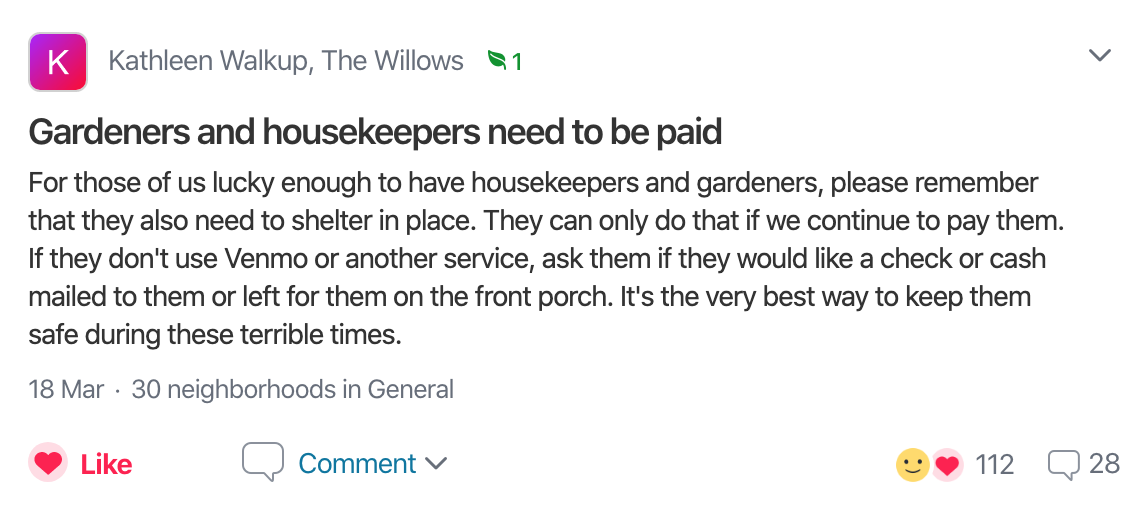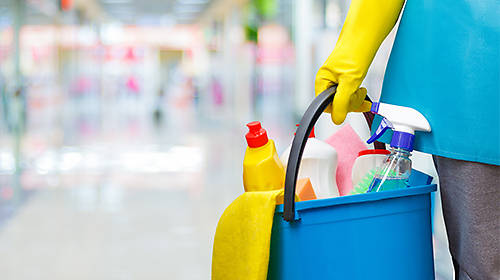
Primavera / Spring 2020
Domestic Workers During COVID-19
I'm sorry Claribel, but because of COVID-19 we do not want you coming to clean our house.
On the week of March 16th, my mother’s life rapidly began to change. Message after message appeared on her phone telling her to stay safe and to please not come to work because of the shelter in place that San Mateo County set in place. The sudden loss of her job made her feel uneasy about what she would expect for the few months ahead, for not only herself, but her family as well. She was not prepared for a pandemic that would hurt her and her whole community. She also had many bills to pay here at home, as well as family in El Salvador who also needed financial help. Most of her bills were not eligible for deferment of payment since companies wanted to maintain payment schedules. My mother, Silvia Claribel Navas, is a domestic worker in the Bay Area who is currently in this predicament. The effects of COVID-19 are being seen everywhere, especially in East Palo Alto, CA where financial disparity is already seen. My mother does not receive financial benefits from a company because she is viewed as an independent employer. Thousands of domestic workers throughout the U.S. also have a similar dynamic.
Meanwhile, workers who are in companies receive benefits such as being paid and are able to make ends meet since they are allowed to work from home. Since COVID-19 hit everyone globally, no one was prepared for what this would mean to them. Now domestic workers are being told not to work and are not being paid, putting them and their families in risky financial situations. These workers rely on their weekly paycheck and are paid usually in cash. This puts domestic workers at a higher risk of experiencing economic strains especially during these hard times. Furthermore, domestic workers are in a disadvantaged position because the majority have no legal status in the U.S.. This places them in a position where their options for economic stability are almost non-existent. Since COVID-19 hit everyone throughout the world, the U.S. has attempted to help its U.S. citizens and residents through benefits such as the stimulus check. Undocumented people without a social security will not receive a stimulus check. These are just some of the government aids that have been handed out that many without legal status will not be able to take advantage of.
The weeks after those initial texts that my mother received, she continued to receive more, but mostly from employers who wanted to pay for every visit that had already been scheduled. Along with offering to pay her to stay home, many even offered a place to stay if she could not afford to pay rent in these difficult situations. After hearing she would continue to be paid through this tough situation, a huge sense of relief passed through my mother’s body. She could not hold back her tears and began to cry in relief realizing that her employers truly cared about her wellbeing and understood the responsibility and position it was placing her if they did not continue to pay her.
The Power of Social Media
 Throughout the whole COVID-19 sheltering in place, I have been keeping up with Nextdoor, an online app that keeps you updated with news happening throughout your community and nearby ones. Nextdoor has allowed thousands of members throughout their communities to connect in a safe way and bring up topics that are important for the community to be aware of. Such as, allowing the community to gain more insight as to how people should pay their domestic workers during these tough times and many more relevant topics. Kathleen Walkup is a neighbor on Nextdoor who created a thread to gain more awareness for domestic workers in the Palo Alto area and how fellow neighbors should continue to pay their domestic workers so they can protect one another from the spread of COVID-19.
Throughout the whole COVID-19 sheltering in place, I have been keeping up with Nextdoor, an online app that keeps you updated with news happening throughout your community and nearby ones. Nextdoor has allowed thousands of members throughout their communities to connect in a safe way and bring up topics that are important for the community to be aware of. Such as, allowing the community to gain more insight as to how people should pay their domestic workers during these tough times and many more relevant topics. Kathleen Walkup is a neighbor on Nextdoor who created a thread to gain more awareness for domestic workers in the Palo Alto area and how fellow neighbors should continue to pay their domestic workers so they can protect one another from the spread of COVID-19.

Many who read the thread were appreciative and also recognized that domestic workers needed their pay. The majority of domestic workers have no legal status and will not receive any benefits that the government has offered such as the stimulus checks or loans. Many in the thread were happy to keep paying their domestic workers during these tough times and many were offering to drop off foods and other products at their houses so that they wouldn’t be exposed to the virus. A comment on Kathleen’s post is from Macrina Ortiz, a domestic worker who is appreciative of those who are helping and continuing to pay their workers.
... I applaud you for seeing the good of our domestic workers. I am a worker proud of what I perform… I have very good people with whom I work and thank God they have deposited for the days that I am at home and they understand the problem that is happening. God bless you noble and good people, take care of yourselves, keep safe in your houses.
It appears that many communities have rallied around their most vulnerable and marginalized members, such as domestic workers, and at a time when the government is failing to help. Through the uses of social media such as Nextdoor it has allowed for the community to be more aware of the reality that many housekeepers and gardeners are currently facing. In a dark situation, communities have gathered together to help people who run great risk of becoming evicted and such.
Being a daughter of a domestic worker, I have seen the financial worries my mother has had to endure these past few weeks. Even though my mother is now financially stable and grateful for those who decide to pay her, COVID-19 has placed financial strains on thousands of vulnerable workers throughout the world. It personally saddens me to see that the government turns a blind eye on people who do not receive company benefits, but work just as hard to make sure they can pay everything they need to pay. We do not know how long we will be in this COVID-19 situation, but together as a community, helping one another out, we can all survive.

